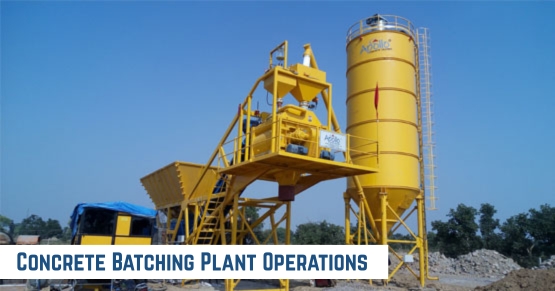Table of Contents
Concrete batching plant operations are undergoing rapid modernization, transforming the demands placed on plant operators. These facilities, once reliant on manual labor, now integrate precision-controlled systems and data-driven decision-making tools. As concrete batching plants continue to scale and diversify across construction sectors, the shortage of skilled labor has emerged as a significant barrier to operational efficiency and long-term sustainability. Bridging this talent gap through specialized training programs has become a critical objective for future plant performance.
Operators are no longer just machine handlers – they must be adapt at understanding plant automation logic, managing material flows, calibrating sensors and interpreting system diagnostics. As such, training the next generation in modern concrete batching plant design principles and operational protocols is imperative. This approach ensures that plants maintain high productivity while adapting to complex batching requirements across varying project scopes.
Changing Operational Landscape in Concrete Batching Plants
Technological integration is redefining how concrete batching plant systems function. With advancements in real-time control software, material monitoring tools and automated dosing systems, today’s operators must possess a hybrid of technical, mechanical and digital skills. Traditional training methods – focused primarily on manual tasks – are insufficient for equipping the workforce to manage high-performance batching systems.
Concrete batching equipment is now designed for minimal intervention but maximum oversight. This includes understanding fault detection mechanisms, optimizing mix design parameters and maintaining compliance with industry-specific batching standards. Inadequate training often results in equipment underutilization, increased batch rejection rates and system downtime. Future-ready operators must be trained to handle multiple variables within the batching environment – temperature, humidity, aggregate moisture levels and mix consistency – all without compromising output standards.
Testimonials
“India’s largest manufacturer of construction equipments. Quality equipments and quick service provider, top class management.”
Impacts of Labor Shortages on Concrete Batching Plant Capacity
Concrete batching plant capacity is directly linked to operator proficiency. When skilled personnel are unavailable, production cycles slow down, maintenance lapses increase and plant throughput suffers. Untrained staff may over-rely on automation, leading to poor responses to critical system alerts or inconsistent batching outcomes. In high-demand environments such as urban infrastructure or highway development, these inefficiencies translate into costly delays and unmet project targets.
Moreover, larger concrete batching plant installations face the compounded challenge of managing multiple concurrent mixes and dispatch schedules. Skilled operators, familiar with batching dynamics and system workflows, can effectively coordinate plant logistics and material flow. Training initiatives must prioritize knowledge transfer in these high-capacity environments, ensuring operational teams understand the nuances of both equipment handling and plant throughput optimization.
Essential Competencies for Next-Generation Operators
The next generation of batching plant professionals must develop competencies in key areas. These include digital control interface navigation, automated material proportioning, preventative maintenance protocols and mix cycle timing. Understanding concrete batching machine functions at a granular level – such as load cell calibration, aggregate bin management and chemical admixture integration – forms the foundation for reliable plant performance.
In addition to technical know-how, decision-making skills are vital. Operators are often required to adjust mix designs based on material availability or environmental conditions. Having the capability to assess, adapt and implement changes without disrupting the batching cycle is crucial. The role now demands real-time analysis and system adaptability, calling for robust training frameworks grounded in both theory and hands-on practice.
Client Speaks
“We have purchased concrete plant & transit mixer from Apollo Inffratech and the working performance of machines are quite satisfactory.”
Training Models for Sustainable Workforce Development
To meet the growing demand for qualified plant operators, specialized training programs must be structured around practical exposure. Simulation-based modules, site-based apprenticeships and system-specific certification tracks are effective models. These allow trainees to interact directly with concrete batching systems, troubleshoot real-time issues and understand operational risks.
Additionally, plant operators can benefit from modular training that focuses on different aspects of concrete batching plant design and functionality. These may include separate tracks for raw material handling, digital interface management and output quality control. Periodic skill assessments and continuous learning opportunities also help maintain operator relevance as technology evolves.
Enhancing Productivity through Skill-Driven Operations
Concrete batching solutions driven by skilled labor offer measurable productivity improvements. From optimized batching sequences to reduced calibration times, efficient operators enable plants to meet tight deadlines while maintaining quality assurance. Their ability to execute adjustments mid-cycle – without halting the entire process – adds to operational flexibility.
Skill-based performance also directly impacts energy and material efficiency. Experienced personnel can identify unnecessary delays in batch cycles, reduce mix variability and implement practices that conserve power and raw materials. This competency is essential for high-output environments that rely on consistent batch timing and repeatable strength characteristics across large volumes.
Conclusion:
Concrete batching plant operations are only as strong as the teams managing them. As systems grow smarter and more integrated, the need for skilled labor becomes not just a support function, but a strategic priority. Training programs tailored to modern plant demands can bridge the talent gap, ensuring concrete batching capacity is fully leveraged and equipment operates at peak efficiency.
Preparing the next generation with comprehensive training in plant mechanics, digital controls and real-time decision-making ensures long-term plant resilience. The industry stands at a pivotal point where investing in human capital is as critical as upgrading machinery.
Table of Contents



